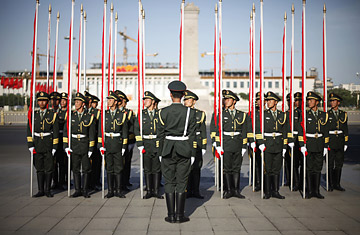
Chinese honor guards stand in position against the backdrop of Tiananmen Square on June 3, 2009
The authorities have also taken more time-honored steps, such as blocking foreign-television camera crews and photographers from entering the square and breaking up interviews with students about their attitudes to what happened in 1989, according to the Foreign Correspondents' Club of China. What's more, the crackdown has not been confined to the capital. Dissidents hundreds of miles away have been rounded up or blocked from leaving their homes in the run-up to the anniversary, human-rights groups allege.
While some of the more stringent measures will likely be lifted once the anniversary is over, some commentators believe that a new era of restriction on all forms of political dissent is here to stay. "It all started long before the Olympics," explains a diplomat. "The authorities jailed or intimidated into silence almost all independent voices, and kept it that way. It gets worse around the time of 'sensitive' anniversaries like June 4 or when the National People's Congress is held, but basically it's a question of degree." (Read "Hong Kong Dissidents Get Organized.")
Critics say that, contrary to conventional wisdom, the bigger a part China plays on the world stage, the more it can impose these kinds of restrictions. "The criticism of these sorts of measures is quite weak," says Cheng Li, a scholar at the Brookings Institution in Washington, D.C. "Domestically, the atmosphere is very nationalistic, and people support the government. Internationally, other countries need China more than ever now so they don't say anything, just send trade delegations." Cheng cites the recent visit of U.S. House of Representatives Speaker Nancy Pelosi as an example of the changes China's rising influence in the world have brought about. Once so passionate a critic of the Chinese government that she unfurled a banner in Tiananmen commemorating the victims of the 1989 crackdown, Pelosi spent several days in China recently without discussing human rights in public at all.
Cheng's theory will be tested soon enough. The next "sensitive" date is Oct. 1, when China celebrates the 60th anniversary of the founding of the People's Republic. Beijing has already announced that it is moving to ensure that there will be no disruption of the ceremonies from foreign or domestic critics, including imposing measures to tighten the issuance of visas. But to the diplomat, using "sensitive" dates is just an excuse. "If it wasn't National Day, it would be something else," the diplomat says. "They just want an explanation that the outside world will accept for what has become a normal state of repression in China. For all intents and purposes, the country is in a near permanent state of lockdown."
Just how long the authorities can maintain such a high pitch of control over dissenters is debatable. As Pei Minxin of Carnegie Endowment for International Peace points out, the party learned many lessons from the debacle at Tiananmen, where at least hundreds were killed. One lesson it really took to heart was that it must win over the kind of social élites — students, urban middle classes, intelligentsia — who led the protests then. That strategy, Pei wrote in a recent paper, has been so successful that "today's Party consists mostly of well-educated bureaucrats, professionals and intellectuals," leaving relatively few educated voices to complain. And despite their sometimes ham-fisted tactics, China's security apparatus is very careful about whom it targets, focusing on only a small group of activists. By contrast, ordinary Chinese have probably never been freer, creating the paradox that "open dissent is stifled, but personal freedom flourishes," says Pei.
Others aren't so sure that the lid can be kept on the numerous problems causing unhappiness in large chunks of Chinese society. Cheng of Brookings, for one, believes the current lockdown can't last. "After one or two years, it will be impossible to keep quiet all the complaints about problems with the environment and corruption and so on," he says. "This can't go on forever."
